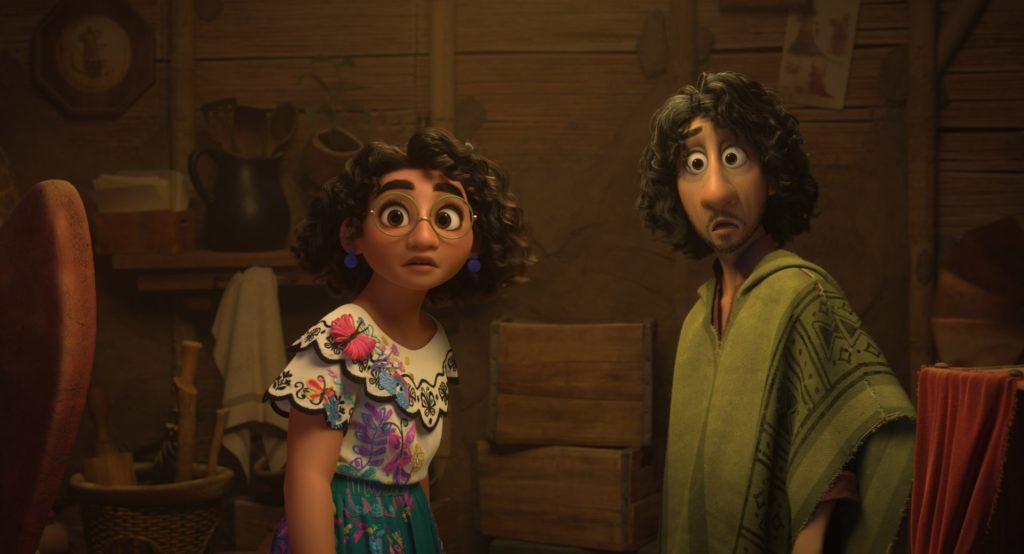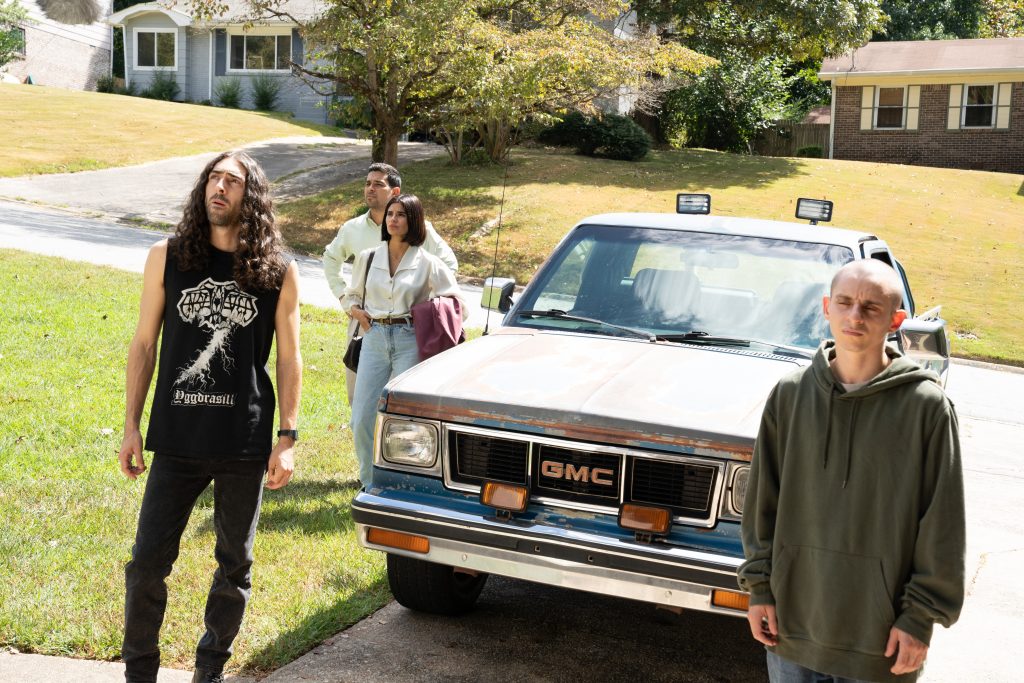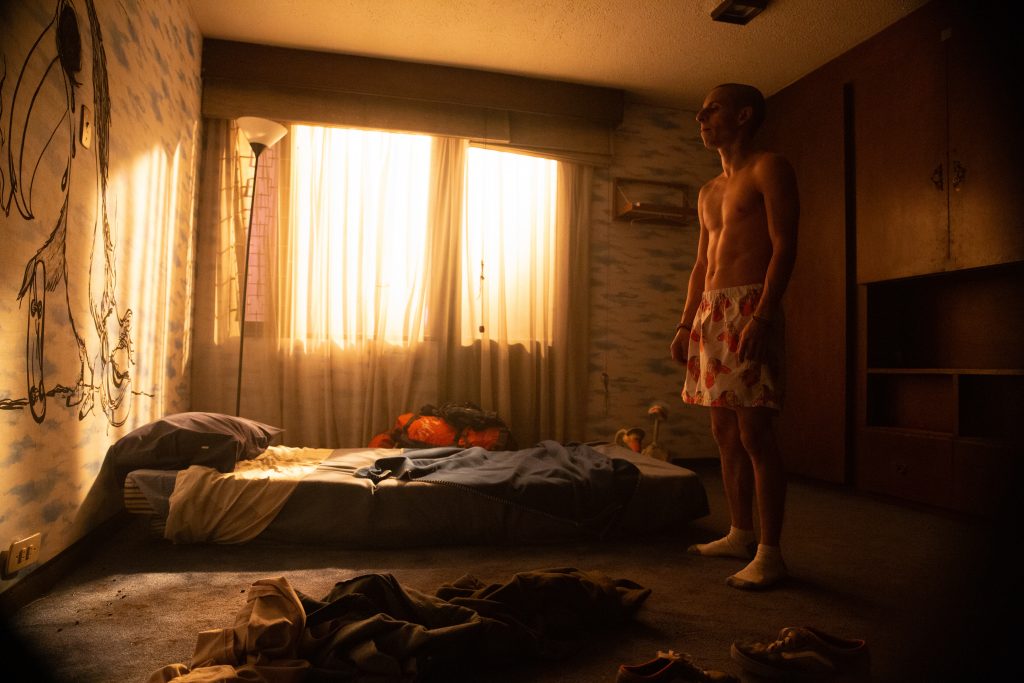November 15, 2021
by Carla Hay

Directed by Jared Bush and Byron Howard; co-directed by Charise Castro Smith
Some language in Spanish with subtitles
Culture Representation: Taking place in Colombia, the animated musical film “Encanto” features an all-Latino cast of characters representing the working-class and middle-class.
Culture Clash: A 15-year-old girl, who feels ordinary in a family blessed with magical powers, tries to find her special talent while also solving the mystery of what happened to her uncle who disappeared years earlier.
Culture Audience: “Encanto” will appeal primarily to people who are interested in stories that have mystical qualities but are also about life’s realities of finding one’s own identity and self-esteem.

Disney’s “Encanto” has some unnecessary clutter in the story, and the music could be better, but this animated film has enough charm to overcome its very noticeable flaws. The story gets a little convoluted and might be confusing to some viewers (especially those who are younger than the age of 7), who could still be entertained by the dazzle of the movie’s vibrant visuals. “Encanto” ultimately has meaningful messages about family and self-confidence that make the movie worthwhile to watch and appealing to many generations of people.
“Encanto” is directed by Jared Bush and Byron Howard and co-directed by Charise Castro Smith. Castro Smith and Bush co-wrote the “Encanto” screenplay. Lin-Manuel Miranda wrote eight original songs for “Encanto.” Manuel previously worked with Walt Disney Animation Studios on 2016’s “Moana.” Howard and Bush’s previous Disney film was 2016’s Oscar-winning “Zootopia,” which Howard directed and which Bush co-wrote and co-directed.
With all these talented filmmakers involved in “Encanto,” it’s not too surprising that the movie looks great and has a solid story concept. What is surprising is that some parts of the movie are more jumbled that they needed to be. And most of the songs, while pleasant, are somewhat forgettable. “Encanto” is not a Disney animated film that’s going to have an Oscar-winning hit song, such as “Let It Go” from “Frozen.” People watching “Encanto” might have trouble remembering at least three songs after watching the movie for the first time.
“Encanto” has a large ensemble cast of characters, and they are all introduced in a somewhat haphazard and rushed way. The characters are at least distinctive from each other, but viewers must have patience in the first 20 minutes of the movie as the characters show more of their individual personalities. There’s a big part of the story about magic and mystical spells that could have been streamlined and simplified, considering that many of this movie’s intended viewers might too young to grasp some of the movie’s concepts about which magical spells should be cast in order for certain things to happen.
In “Encanto,” which is set in Colombia, the story is centered on the Madrigal family, which lives in a magical place in the mountains called Encanto. It’s a family tradition that when each child in the family turns 5 years old, the child finds out during a ceremony what special power has been bestowed on them. The given power is revealed when a magical door opens in the house to reveal an enchanted space, where the child enters to get the power that is officially bestowed on the child. The power is then used as a gift to help people in the community.
This tradition in the Madrigal family began about 50 years earlier, when a young, married couple named Alma and Pedro Madrigal fled their home with their baby triplets, due to an invasion of their land, and Pedro tragically died while in captivity. After her husband’s death, Alma said a prayer to a mystical candle, which resulted in the miracle creation of Encanto, a safe and magical place to live. This candle is considered the key to the family’s magical powers.
Alma’s triplets (two daughters and a son) grew up in Encanto. The daughters got married to loving husbands, and they had children of their own. Meanwhile, Alma’s son became estranged from the family because he has psychic powers, and the family didn’t like his “gloom and doom” predictions. He has disappeared, so part of the movie is about discovering what happened to him.
Alma’s 15-year-old granddaughter Mirabel is the movie’s protagonist. Mirabel is energetic and kind-hearted, but she insecure about herself and how she is perceived by her family. In total, there are 12 people in the Madrigal family who are in “Encanto.” It’s a lot of characters to keep track of in the story, and it might be too much for people with short attention spans.
The 12 members of the Madrigal family featured in “Encanto” are:
- Abuela Alma (voiced by María Cecilia Botero for spoken dialogue and voiced by Olga Merediz for singing) is the matriarch. She sometimes overreacts if she thinks any danger will come to her family.
- Julieta (voiced by Angie Cepeda), one of Alma’s triplet daughters, has the power to heal.
- Agustín (voiced by Wilmer Valderrama) is Julieta’s supportive and mild-mannered husband. Julieta and Agustín have three daughters.
- Isabela (voiced by Diane Guererro), the eldest daughter of Julieta and Agustín, is as close to perfect as possible, in terms of her beauty and intellect. She has the power to make flowers and other plants grow.
- Luisa (voiced by Jessica Darrow), the middle daughter of Julieta and Agustín, is tall and muscular. Her power is super-sized strength.
- Mirabel (voiced by Stephanie Beatriz), the youngest daughter of Julieta and Agustín, was not bestowed any special gift/talent/power at 5 years old, and she feels very insecure about it. Mirabel is now 15 and struggling with self-confidence issues and feeling like she doesn’t fit in with her family.
- Pepa (voiced by Carolina Gaitan), Alma’s other triplet daughter, has the power to control the weather with her emotions.
- Félix (voiced by Mauro Castillo) is Pepa’s goofy and fun-loving husband. Pepa and Félix have two sons and one daughter.
- Camilo (voiced by Rhenzy Feliz) is the older son of Pepa and Félix. A natural extrovert and entertainer, Camilo has the power to shape shift.
- Dolores (voiced by Adassa Candiani) is the daughter of Pepa and Félix. Her power is an extraordinary hearing ability, so naturally she’s become a nosy busybody who likes to find out other people’s secrets.
- Antonio (voiced by Ravi Cabot-Conyers) is the younger son of Pepa and Félix. Antonio, who is quiet and shy, has the ability to communicate with animals.
- Bruno (voiced by John Leguizamo) is Alma’s prodigal son who has the aforementioned psychic power. Bruno’s “tell it like it is” nature might be too blunt for some people, so he sometimes has a tendency to rub people the wrong way.
You know a movie might have too many characters when it has to spend so much screen time explaining who everyone is before getting to the real action in the story. It takes a while for it get going, but eventually Mirabel goes on an adventure that involves finding the long-lost Bruno, whom she has never met before. Something happens that causes her family to lose their powers, and Mirabel gets blamed for it. A great deal of the story is about how she tries to make things right and get the magical powers restored to her family.
There are also some subplots about the family dynamics. Mirabel and Isabela have a tension-filled relationship because Mirabel is jealous of Isabel being the family’s “golden child,” while Isbael acts haughty and superior to Mirabel, even though Isabel secretly resents the pressure that she feels to be “perfect.” Meanwhile, Isabela is being courted by a handsome neighbor named Mariano Guzmán (voiced by Maluma), who seems like an ideal match for her. It’s a courtship that gets the approval of Isabela’s parents and Mariano’s parents, but does Isabela really want to get married?
When Mirabel finds Bruno, she discovers he’s not the terrible person he’s been described as by some people. (It’s not spoiler information to say that Mirabel and Bruno end up meeting, since it’s revealed in the movie’s trailer.) Mirabel and Bruno bond over feeling like “outsiders” in the family. The friendship that develops between Bruno that Mirabel is one of the movie’s highlights. Bruno also has a trusty toucan, because a movie like this always seems to have at least one or two helpful animal friends that are sidekicks for the human characters.
Since “Encanto” is a musical, the score and songs are placed in the movie at a pace that flows fairly well. The original songs in “Encanto” are good, but not amazing. Except for a few standouts though (such as the ensemble tunes “We Need to Talk About Bruno” and “All of You”), most of the songs are not as memorable as people might expect them to be, considering that they were written by “Hamilton” mastermind Miranda.
The “Encanto” original songs are pleasant enough, but will they resonate with people emotionally to the point where most people will want to re-watch “Encanto,” just to see the songs performed in the musical scenes? That’s highly doubtful. “Encanto” is not a movie that is going to inspire a sing-along version, like Disney did for “Frozen.” The songs of “Encanto” are just not as interesting as the characters that perform these songs.
“Encanto” offers some stunning visuals, which are the movie’s biggest assets. The movie also has lovely homages to Colombian culture, based on how various Colombian food, clothing and customs are featured in the story. All of the cast members are perfectly fine in their roles, with Leguizamo and Beatriz getting most of the best lines of dialogue in the movie. Overall, “Encanto” efficiently follows the tried-and-true formula of family-oriented animated films where the protagonist starts off feeling like a misfit and goes on a life-changing journey of self-acceptance.
Walt Disney Pictures will release “Encanto” in U.S. cinemas on November 24, 2021. Disney+ will premiere the movie at no additional cost on December 24, 2021.






